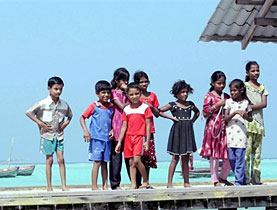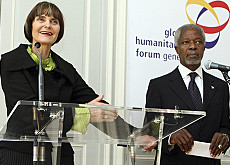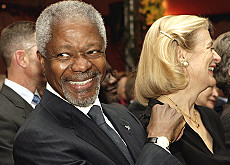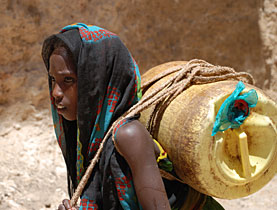Forum launches global climate justice alliance

Former United Nations Secretary-General Kofi Annan has launched a global alliance for climate justice at the first meeting of the Global Humanitarian Forum.
The two-day meeting in Geneva aimed to address the “human face of climate change” and to bring together different actors that don’t normally work side by side to discuss how best to adapt.
Some 300 luminaries from the world of politics, business, diplomacy and development took part in the discussions and identified a number of solutions that will be fed into discussions leading up to the critical post-Kyoto climate conference in Copenhagen in December 2009.
“Climate change is very real and is happening now. We will build a global alliance for climate justice and it must be at the heart of Copenhagen,” said Annan at the first high-level meeting of his new humanitarian forum.
“As an international community, we must recognise that the polluter must pay and not the poor and vulnerable.”
Those attending included British entrepreneur Richard Branson, former United Nations rights chief and Irish President Mary Robinson, economist Jeffrey Sachs and president of the Maldives Maumoon Abdul Gayoom.
Empowerment
Annan said communities needed to be empowered with the knowledge and tools to deal with the worst effects of climate change.
“We cannot allow the extra cost of adapting to climate change to be siphoned off from the ongoing poverty challenge. We should act immediately to provide them with additional funding and appropriate technical assistance,” he said.
Concrete solutions from the Geneva meeting included a project to ensure “weather data for all” focusing on Africa, and a solar lantern initiative, spearheaded by Rajendra Pachauri, chairman of the Nobel Peace Prize winning Intergovernmental Panel on Climate Change.
The forum also identified water, the transfer of sustainable technologies and agriculture as the sectors in need of action. Delegates were also enthusiastic about the idea of providing insurance to poor farmers.
According to the forum organisers, ideas will now be turned into action with a targeted follow-up and the first results will be presented at the second annual meeting in June 2009.
Costly adaptation
But Annan noted that these new technologies come at a high price.
“There is an urgent need to mobilise funds combining the power of the public and private sectors,” he said.
Yvo de Boer, head of the UN Climate Change Secretariat, said hundreds of millions of dollars would be needed each year to kick-start climate change adaptation.
A UN fund to help poorer nations adapt to global warming currently only has $58 million (SFr60.4 million).
“I think it would send a huge signal of encouragement to developing countries if rich nations were also to significantly contribute to the fund to show that they are taking the question of adaptation seriously,” de Boer said.
Looking ahead to next year, de Boer said he was disappointed with the slow pace of progress towards a new climate deal and said clarity was needed on mid-term targets before the Copenhagen meeting.
In a panel discussion, he blamed “an unbelievable – almost criminal – lack of leadership” and urged heads of state to put more pressure on their negotiators.
Criticism
Reactions after the two-day meeting were mixed. De Boer felt that with climate change becoming a “technocratic” debate the focus had been the right one.
“I think the equity aspect of climate change is very important. A forum like this can help highlight how climate change is affecting poor people. But at the same time I would be concerned if the search for the perfect definition of equity becomes a reason to delay action,” he told swissinfo.
The Swiss ambassador to the UN, Blaise Godet, agreed it “was on the right path”.
“I think the meeting was a success. But I’m aware it will only be a complete success story when these annual get-togethers become the main venue for stakeholders in humanitarian affairs – but it’s a bit too early,” he said.
But there was criticism from some sides that participants had been too high-level, the press had been excluded from workshops and, despite good intentions, the proposals were unlikely to lead to concrete action.
“We have to make an effort to make it more down-to-earth in the future. We had interesting discussions but some of them were quite abstract,” said Godet.
swissinfo, Simon Bradley in Geneva
The Global Humanitarian Forum was founded in June based on an initiative put forward by the Swiss foreign ministry. It aims to boost dialogue between all parties involved in humanitarian aid, acting as a catalyst, and to build bridges between areas that otherwise had little contact.
The forum’s planned annual budget is SFr4 million ($3.85 million). It has so far received around SFr2.3 million, including SFr1.3 million from Switzerland. Once underway it would fund ten per cent of its operational budget up to a maximum of SFr500,000 a year.
On Tuesday the forum director, Walter Fust, criticised the level of Swiss funding.
“We are not yet happy with the Swiss contribution,” Fust told Swiss national radio, adding that he had already received other offers to move the forum to other cities.
Board member Ivan Pictet said there had been a “misunderstanding” with Foreign Minister Micheline Calmy-Rey concerning the financial envelope and a revision would allow things to be revised in the right way.
In a report issued last year, scientists from the United Nations Intergovernmental Panel on Climate Change (IPCC) said it was “very likely” – or more than 90 per cent probable – that global warming was man-made.
The report predicted a “best estimate” that temperatures would rise by between 1.8-4°C in the 21st century, within a likely range from 1.1-6.4°C.
The study projected a rise in sea levels of between 28-43cm in the 21st century.
Another IPCC report said that a warming world would place hundreds of millions of people at greater risk of food and water shortages and threaten the survival of thousands of species of plants and animals.
Floods, heat waves, famines, storms and droughts are all expected to increase, with people in poorer countries suffering the worst effects.

In compliance with the JTI standards
More: SWI swissinfo.ch certified by the Journalism Trust Initiative




You can find an overview of ongoing debates with our journalists here. Please join us!
If you want to start a conversation about a topic raised in this article or want to report factual errors, email us at english@swissinfo.ch.